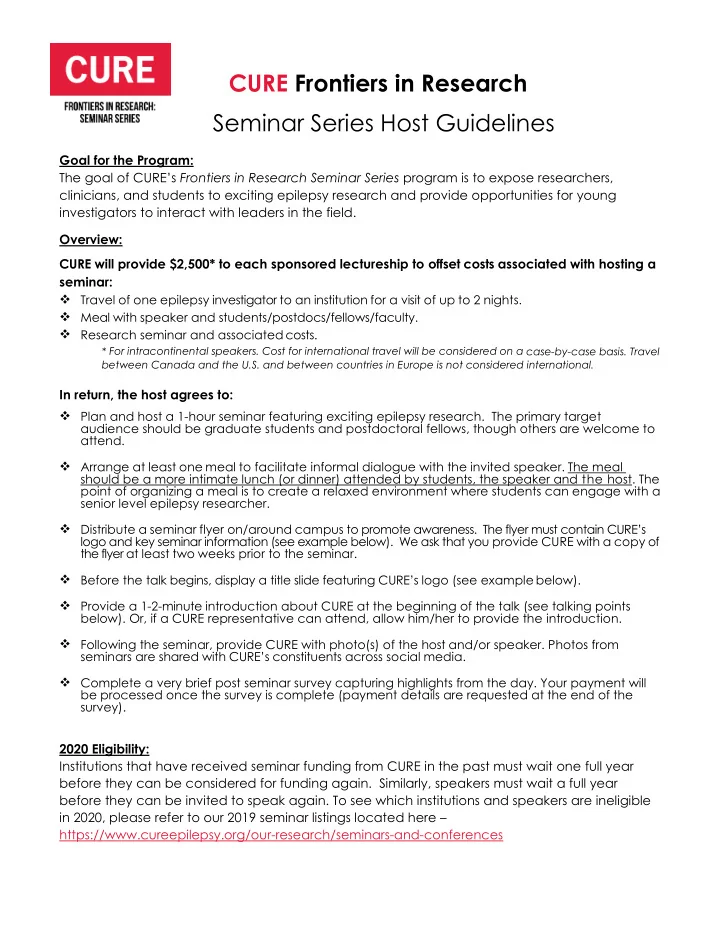

CURE Frontiers in Research Seminar Series Host Guidelines Goal for the Program: The goal of CURE’s Frontiers in Research Seminar Series program is to expose researchers, clinicians, and students to exciting epilepsy research and provide opportunities for young investigators to interact with leaders in the field. Overview: CURE will provide $2,500* to each sponsored lectureship to offset costs associated with hosting a seminar: ❖ Travel of one epilepsy investigator to an institution for a visit of up to 2 nights. ❖ Meal with speaker and students/postdocs/fellows/faculty. ❖ Research seminar and associated costs. * For intracontinental speakers. Cost for international travel will be considered on a case-by-case basis. Travel between Canada and the U.S. and between countries in Europe is not considered international. In return, the host agrees to: ❖ Plan and host a 1-hour seminar featuring exciting epilepsy research. The primary target audience should be graduate students and postdoctoral fellows, though others are welcome to attend. ❖ Arrange at least one meal to facilitate informal dialogue with the invited speaker. The meal should be a more intimate lunch (or dinner) attended by students, the speaker and the host. The point of organizing a meal is to create a relaxed environment where students can engage with a senior level epilepsy researcher. ❖ Distribute a seminar flyer on/around campus to promote awareness. The flyer must contain CURE’s logo and key seminar information (see example below). We ask that you provide CURE with a copy of the flyer at least two weeks prior to the seminar. ❖ Before the talk begins, display a title slide featuring CURE’s logo (see example below). ❖ Provide a 1-2-minute introduction about CURE at the beginning of the talk (see talking points below). Or, if a CURE representative can attend, allow him/her to provide the introduction. ❖ Following the seminar, provide CURE with photo(s) of the host and/or speaker. Photos from seminars are shared with CURE’s constituents across social media. ❖ Complete a very brief post seminar survey capturing highlights from the day. Your payment will be processed once the survey is complete (payment details are requested at the end of the survey). 2020 Eligibility: Institutions that have received seminar funding from CURE in the past must wait one full year before they can be considered for funding again. Similarly, speakers must wait a full year before they can be invited to speak again. To see which institutions and speakers are ineligible in 2020, please refer to our 2019 seminar listings located here – https://www.cureepilepsy.org/our-research/seminars-and-conferences
To apply for seminar series funding, provide CURE with the intended timing of the seminar (Spring/Summer/Fall), Institution name and expected number of attendees. Please name at least three potential speakers and a description of the seminar that identifies the relevance to epilepsy. For more information, please contact Research@CUREepilepsy.org
Speaker: Jaideep Kapur MD PhD Eugene Meyer III Professor of Neuroscience Professor of Neurology Director, Neurosciences Center at University Virginia Health Sciences Center. “ Status Epilepticus Research: my adventures” Statement of Research: Goal of this talk is to highlight importance of novel scientific approaches and team science in epilepsy research. Changing focus from the role GABA - mediated inhibition to AMPA mediated excitatory transmission allowed us to use novel brain mapping techniques and genetic tools to gain novel insights into pathophysiology of status epilepticus. January 9 th , 2018 12:00- 1:00 PM AMC- V20-1000 Skaggs Pharmaceutical Sciences Bldg. CURE (Citizens United for Research in Epilepsy) is a 501(c)3 dedicated to finding a cure for epilepsy (www.CUREepilepsy.org). 1
Talk Title Speaker CURE (Citizens United for Research in Epilepsy) is a 501(c)3 dedicated to finding a cure for epilepsy.www.CUREepilepsy.org *RESEARCH GRANTS * INITIATIVES * SEMINAR SERIES * CONFERENCES *
CURE Frontiers in Research Seminar Series Talking Points • Approximately 3.4 million Americans (1% of population) and 65 million people worldwide have epilepsy. 1 in 26 Americans will develop this condition in their lifetime. • For 50% of patients, the cause of their epilepsy is unknown and over 30% do not have their seizures controlled by any of the currently available treatments. • CURE was founded in 1998 by Susan Axelrod and a small group of parents whose children were impacted by epilepsy. In the time since, CURE has become the largest non- governmental funder of epilepsy research. • Since its inception in 1998, CURE has raised more than $60 million to fund research and other initiatives that will lead the way to a cure. • CURE has funded over 220 research grants in 15 countries * and has taken on four major initiatives in critical research areas – infantile spasms, epilepsy genetics, sudden unexpected death in epilepsy, and post-traumatic brain injury. • CURE has led a dramatic shift in the epilepsy research community from simply treating seizures to enhancing understanding of underlying mechanisms and causes, so that cures and preventative strategies can be found. • Please visit the CURE website to learn more. www.CUREepilepsy.org * As of April 2019
Recommend
More recommend